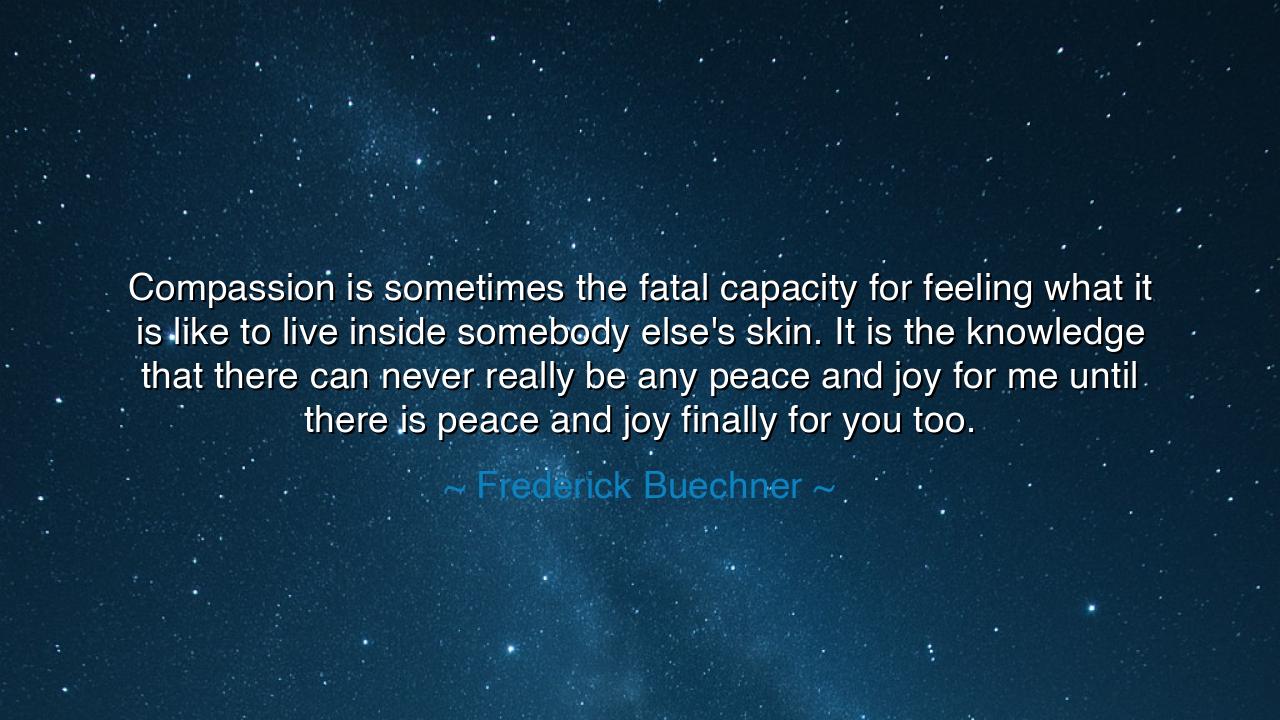
Compassion is sometimes the fatal capacity for feeling what it is
Compassion is sometimes the fatal capacity for feeling what it is like to live inside somebody else's skin. It is the knowledge that there can never really be any peace and joy for me until there is peace and joy finally for you too.






Hear, O children of the spirit, the words of Frederick Buechner, prophet of the heart, who declared: “Compassion is sometimes the fatal capacity for feeling what it is like to live inside somebody else’s skin. It is the knowledge that there can never really be any peace and joy for me until there is peace and joy finally for you too.” These words are not spoken lightly, but with the gravity of one who has walked through sorrow and glimpsed the deep truth of love: that the fate of each soul is bound to the fate of all.
The origin of this saying lies in Buechner’s life as preacher and storyteller, weaving theology with the realities of suffering. He knew that compassion is no gentle luxury, but a dangerous, even fatal capacity—for to feel another’s pain as your own is to risk being pierced by wounds not your own. Yet he also knew that this risk is the essence of love. For true peace cannot be selfish, and true joy cannot be hoarded. What use is laughter in one’s own house if the neighbor’s house is filled with mourning?
Consider, O listener, the tale of the Good Samaritan told in ancient days. A man beaten and left for dead lay by the road. Many passed by, unwilling to risk their comfort for another’s misery. But one stopped, entered the man’s pain, and bore it upon himself. This was compassion—the dangerous act of dwelling in another’s skin, of seeing his wounds as your own. The Samaritan understood Buechner’s truth: there could be no true peace for him unless this stranger, too, was healed.
Or reflect upon the life of Mahatma Gandhi. He did not live in luxury while his people suffered under oppression. He clothed himself simply, ate humbly, and bound his life to theirs. His compassion was not sentiment, but identification—he felt India’s hunger as his hunger, her humiliation as his humiliation. And because of this, his voice carried the power to awaken a nation. His life embodied Buechner’s vision: that joy for one is incomplete unless it is joy for all.
Yet let us not imagine that compassion is easy. Buechner calls it “fatal,” for it costs us. It demands that we break the armor around our hearts, that we let in the pain we would rather ignore. To be compassionate is to refuse the illusion that our lives are separate. It is to say: Your suffering diminishes me; your healing restores me. It is the dangerous knowledge that binds the human family together in both grief and triumph.
The lesson is plain: if we would know true peace and joy, we must go beyond ourselves. The pursuit of personal happiness alone is barren; it yields a shallow and fleeting satisfaction. But when we anchor our joy in the well-being of others, when we labor so that our neighbors may flourish, then our joy becomes deep and enduring. For in lifting others, we lift ourselves; in binding their wounds, we heal our own souls.
Practical actions lie before you. Listen deeply to those who suffer; let their voices shape your heart. Give generously, not only of wealth, but of time, presence, and empathy. Stand with the oppressed, even when it costs you. In your families, in your work, in your communities, practice the art of seeing through another’s eyes. And when you feel tempted to retreat into comfort, remember Buechner’s truth: there is no peace for one until there is peace for all.
So let these words be carved upon your soul: compassion is the bridge that unites all lives. It is not weakness but strength, not sentiment but the very ground of justice and joy. Embrace it, even at cost, for only then shall you taste the fullness of life. For what is the worth of my joy, if my brother weeps? What is the strength of my peace, if my sister still trembles? Let us then live as one body, one family, one destiny—for in your flourishing lies mine, and in my joy lies yours.






AAdministratorAdministrator
Welcome, honored guests. Please leave a comment, we will respond soon